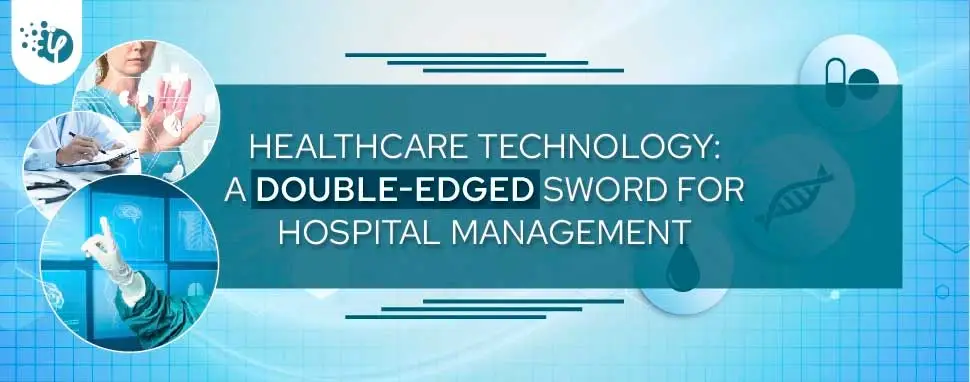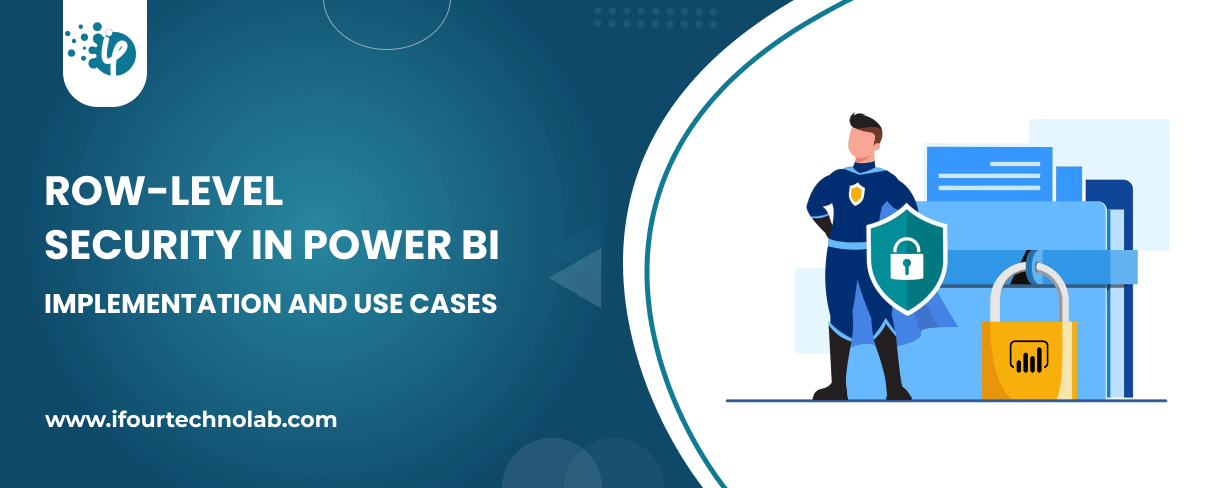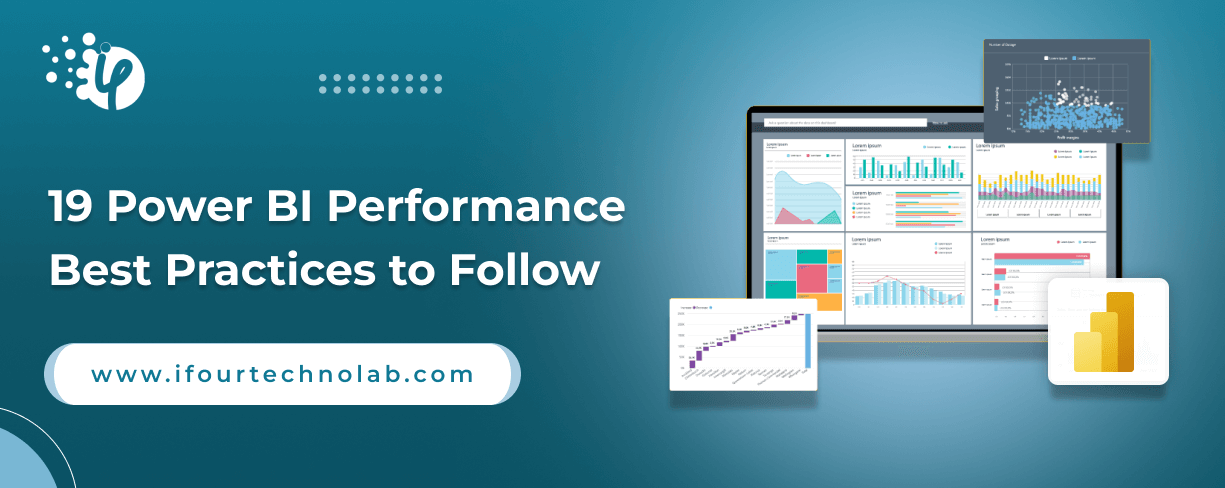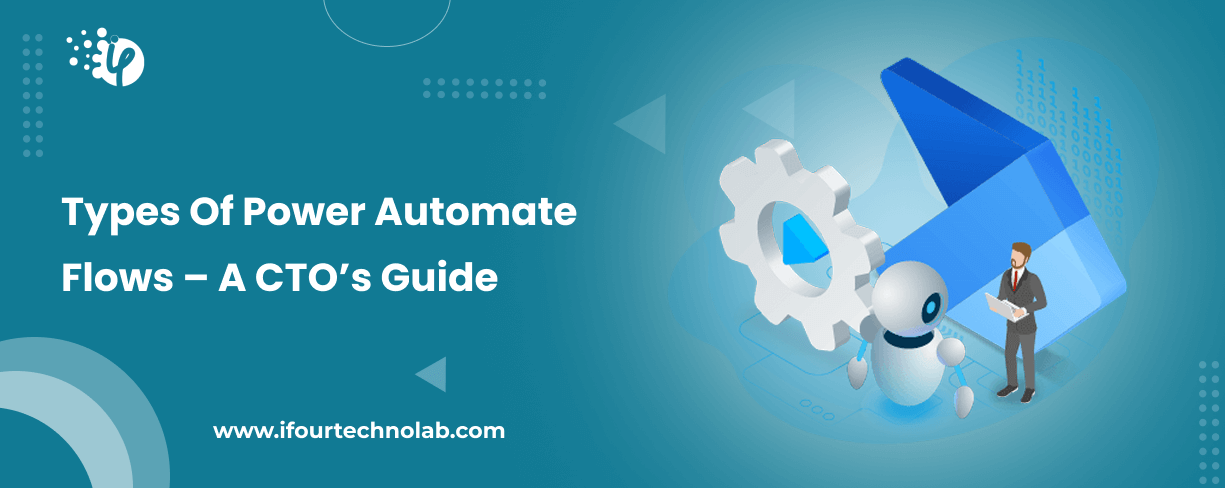Row-Level Security in Power BI: Implementation & Use Cases
The very first reason why you should implement Row Level Security is to foster trust, a crucial element for any business's success. Next, it reduces data clutter and helps you load...
Kapil Panchal - September 21, 2022
Listening is fun too.
Straighten your back and cherish with coffee - PLAY !

You may be wondering how technology can be a two-edged sword despite being the driving force behind industries' dramatic success and transformation. Technology, like any other platform, also have both beneficial and harmful consequences. They have been phenomenal in making processes smarter and easier while reducing healthcare disparities to a large extent.
Tech-infused solutions are being incorporated into healthcare management systems to reduce inefficiencies and provide quality healthcare. Here, in this blog, we will shed light on how technologies can be a double-edged sword in the healthcare business.
Technology has brought about many changes in the way the Healthcare industry operates. While it has made it easier for patients to access information and for doctors to diagnose and treat patients, it has also introduced new risks and challenges.
One of the main benefits of technology in healthcare is that it has made it easier for patients to access information. They can now find information about health conditions and treatments online, and this has helped them to become more informed and involved in their own care. In addition, online tools such as patient portals allow patients to access their medical records, communicate with their doctors, and make appointments online. This has made it easier for patients to get the care they need and has improved communication between patients and doctors.
However, technology has also introduced new risks and challenges into the Healthcare industry. For example, electronic health records can be hacked, and this could lead to the theft of patients' personal information. In addition, the use of technology in healthcare can lead to medical errors. For example, doctors may order the wrong tests or prescribe the wrong medication because they are relying on information from electronic health records.
Overall, technology has had both positive and negative effects on the Healthcare industry. While it has made it easier for patients to access information and for doctors to diagnose and treat patients, it has also introduced new risks and challenges.
Technology is completely intertwined with the healthcare industry these days. It helps with anything from a patient accessing their records, hospital administrative tasks, improvement of practices and treatments, training of future healthcare professionals, data storage, and more. However, whenever someone’s data is stored digitally, there is a risk of a data leak. Nobody is entirely protected against cyberattacks – hospitals and healthcare workers included.
While technology can provide much-needed efficiency and accessibility to many processes within the healthcare industry, that efficiency comes along with a drop in human connection. Healthcare is fundamentally a human field—it requires a connection to be developed between the patient and the care provider, so this distance created by increased use of technology and automation can be troubling and even harmful to that relationship.
The healthcare industry is under constant pressure to cut costs and improve efficiency. In many cases, technology is seen as the answer to these challenges. However, technology can also be a double-edged sword for the healthcare industry. On the one hand, technology can help to improve efficiency and reduce costs. On the other hand, technology can also lead to increased costs and inefficiencies.
One of the key benefits of technology is that it can help to improve efficiency. For example, technology can help to automate processes and to reduce the need for manual input. This can help to improve speed and accuracy and to reduce costs. In addition, technology can help to improve communication between healthcare providers and patients. This can help to improve the quality of care and to reduce the need for repeat visits.
However, technology can also lead to increased costs and inefficiencies. For example, technology can lead to the development of new and expensive treatments. This can put pressure on healthcare providers to adopt these treatments, even if they are not necessarily the best option for the patient. In addition, technology can also lead to the development of new and expensive diagnostic tools. This can lead to increased healthcare costs for patients.
Ultimately, technology can be a double-edged sword for the healthcare industry. On the one hand, it can help to improve efficiency and reduce costs. On the other hand, it can also lead to increased costs and inefficiencies.
While it seems like a great idea for AI to help assist doctors in things like diagnosing patients and prescribing medicine, it can prove to be problematic in the long run. AI takes the individual out of the equation. Both on the patient side, as well as the doctor's side. Each patient is different. They have different needs, will react differently to various meds, etc. It will be a long time, if ever, before AI can be programmed to treat each patient as the individual they are. It also doesn't account for a doctor's intuition. How many diseases have ultimately been discovered in patients because a doctor had a hunch?
The healthcare industry is in a unique position when it comes to technology. On the one hand, technology has the potential to improve healthcare outcomes and make the industry more efficient. On the other hand, technology can also be a double-edged sword, with the potential to do more harm than good.
One of the biggest benefits of technology in healthcare is the ability to collect and track data. This data can be used to improve patient outcomes by identifying trends and helping to personalize treatments. It can also help to make the healthcare industry more efficient by identifying areas where improvements can be made. For example, technology can be used to improve the accuracy of billing and reduce the amount of time spent on administrative tasks.
However, technology can also have negative consequences for the healthcare industry. For example, the use of electronic health records (EHRs) can lead to data breaches, as well as privacy and security concerns. Additionally, the use of technology can sometimes lead to medical errors, such as when doctors rely too heavily on technology to make diagnoses.
Overall, technology can be a double-edged sword for the healthcare industry. While it has the potential to improve outcomes and efficiency, it can also lead to negative consequences. It is important for healthcare organizations to weigh the pros and cons of using technology before making any decisions.
In this swiftly developing digital age, few industries are undergoing more significant changes than healthcare. Technology is motivating people to take care of their health. It's enabling accelerating personalized communications between patients and professionals. Moreover, it's healthcare organizations to disrupt conventional business models by engaging with distinct customers in more instantaneous, dynamic, and rewarding ways.
Technology is a double-edged sword - the more we count on it, the less our humanness emerges to matter. Precisely speaking, how can our human qualities come to the fore and ensure that these staggering technological innovations serve two concurrent purposes, for example, help people live longer and grow brands.
With the exponential growth in technological innovations over the past few years, technology has become quite complex. It is difficult to place technology in any one criteria or box as it comes with immense advantages, but we also have to be wary of its negative implications. Very few industries are going through intense changes and one of the prominent ones is healthcare.
Technology has given people the power to take care of their health on their own without having to physically go to a hospital or connect with a doctor.
Consultations can be managed from the vicinity of their homes but there are so many symptoms that can easily be missed when the patient is not physically present in front of the doctor. On one side technology has fueled extremely personalized interactions between professionals and patients, disrupting the entire conventional business model. Customers are engaged in a more dynamic, immediate, and rewarding method of receiving healthcare.
However, this extreme reliance on technology reduces the significance of humanness. The use of technology in the hands of patients now, as smartphones and their associated technology continues to advance, device companies are rapidly targeting asymptomatic and pre-symptomatic populations, reaching not only patients but also healthy consumers.
Technology can help us reach patients even though they don't visit us personally in the clinic. The pandemic has shown us that tell consult is possible, albeit has big limits. The biggest setback here is the possibility of misdiagnosis during teleconsultation as the patient is not physically examined. There have been many reports that lacking care has been given to patients who underwent teleconsultation only mainly because they were not fully diagnosed. Hence, this makes teleconsultation technology a double-edged sword in terms of the Healthcare industry.
While there is no doubt that technology has revolutionized the healthcare industry, it can also be a double-edged sword. On the one hand, technology has led to breakthroughs in diagnosis and treatment, resulting in better patient outcomes. However, on the other hand, technology can also be a source of errors and inaccuracies. For example, electronic health records are often riddled with errors, which can lead to dangerous medication errors.
In addition, diagnostic devices can sometimes produce false-positive results, leading to unnecessary and potentially harmful treatments. As healthcare providers strive to strike a balance between the benefits and risks of technology, it is clear that technology can be both a blessing and a curse for the healthcare industry.
Technology has been a double-edged sword for the healthcare industry. On one hand, it can help patients who need access to care and information. On the other hand, it can be used by hackers to hack into medical records or even cause physical harm to patients.
There are three main ways that technology has impacted healthcare:Reducing costs, increasing patient satisfaction, and improving clinical outcomes. The use of technology in clinical practice has made it easier for patients to follow their doctors' orders, understand their course of treatment, and manage their conditions more effectively. With improved communication between doctors and patients, many medical conditions can be managed successfully without surgery or invasive procedures.
However, there are also some downsides to this technology:clinicians must make sure they're using appropriate technology that's not vulnerable to cyber-attacks; patients should only use protected websites when accessing medical records and parents should monitor their children's use of social media sites so they don't become victims of hackers who may be impersonating family members or friends they know well enough.
Technology can be a double-edged sword for the Healthcare industry because it can help improve the quality of care and make it more accessible and affordable. Still, it can also create new challenges and risks. For example, using electronic health records can help reduce medical errors, but it can also lead to privacy and security concerns. On the other hand, electronic health records can improve communication between doctors and make tracking patients’ medical history easier. As a result, new medical technology can improve patient care, leading to higher costs and a more complex healthcare system.
Technology can be a double-edged sword for the healthcare industry in two ways.
First-way: -We can analyze more data, identify patterns and trends, and develop new treatments more quickly than ever before. However, this also means that we are easily distracted and prone to forgetful errors. We should be careful not to lose sight of our original goal: making sure that patients get the best care possible.
Second-way:Technology has been a double-edged sword for the healthcare industry is by allowing us to connect with people all over the world. As a result, we have been able to learn more about what works in other cultures and how other people live their lives than ever before. However, this knowledge has often come at the expense of authenticity - we may have learned about another culture's practices without understanding why they do them or whether those practices are appropriate for our patients' needs or experiences (or even if they're even necessary).
In this digital age, technology is taking healthcare to a different level. It has improved several aspects of healthcare including patient management and health care team dynamics. In addition, it helps in accuracy of diagnosis, clinical efficiency, and overall patient care. However, when technology is misused or not handled properly then it becomes a problem. For example, electronic health records can be easily accessed by the staff and when a patient files a complaint, the hospital may face a very expensive lawsuit. Technology is definitely beneficial for the healthcare industry, but the risks should not be ignored.
The use of technologies in the healthcare industry has allowed us to take care of our health very well and have personalized communication with doctors in real time. It helps us keep our health in good condition and live longer. However, IoT devices in the healthcare industry give birth to cybersecurity problems. Often, unauthorized individuals and hackers break into the online security systems, steal valuable patient data, corrupt valuable research data, and cause damage to hospitals and clinics. Doctors and physicians are increasingly using communication tools to communicate with patients and provide the requested treatment. But there is a lack of human touch in such processes. Connected medical devices and dashboards eliminate human contact in treatments. 80% of Americans have frustrating experiences when receiving medical treatments in hospitals that use technologies.
Technology has developed every aspect of healthcare delivery, including staff management, patient care, and automating various processes. Despite various advantages, it has shortcomings too. If handled by inefficient staff or used clumsily, the technology might prove disadvantageous to a healthcare company. Moreover, technology has left its mark on this hospital management and has started to play a massive role.
Accepting technology helps diagnose patients more precisely while managing equipment, personnel, finances, inventory, planning, strategy, and staff performance. Nowadays, technology has brought us to a situation where one can understand what’s happening in the hospital at the click of a button.
On one hand, it can provide more efficient and effective care. On the other hand, it can also lead to potential privacy breaches, increased costs, and decreased access to healthcare. The modern era of technology has created a lot of opportunities for healthcare professionals. However, these opportunities may also come with risks that need to be addressed before they become too big for the industry to handle. Healthcare providers are now looking for ways to bridge the gap between technology and their patients' needs without compromising patient privacy or safety in any way.
The healthcare industry has witnessed massive transformation ever since we have applied innovations and technologies in the medical field. Technologies have paved the way for in-depth patient body analysis and detailed reports of their health conditions. It also offers greater accuracy in diagnosing critical health conditions, along with providing help in patient care and reducing medical errors. However, besides offering several benefits in the health care sector, technologies can initiate impersonal interaction between doctors and patients. Thus, technologies can affect the poor implementation of the medical processes and care for the patients' health conditions.
The Healthcare industry can benefit a lot from technology. In fact, I’m a big believer in how technology can help the Healthcare industry evolve into something more accessible and more advanced, to help people in a better way. However, I don’t deny that technology comes with its downfalls, and not every aspect of it is good for the Healthcare system.
The best things about technology in healthcare, are better accessibility for patients (online consults and forms, phone-call and video conference doctor appointments, online resources for symptoms and diagnosis…)
Technology can also help automate a lot of healthcare system processes, which allows the service to be provided better and faster, with healthcare workers are given more time to actually attend to patients.
However, as a double-edged sword, technology can also limit access to patients. When everything is transferred to online use, a lot of older patients can struggle to contact their medical centers, as well as their doctor appointments, and more.
The increase in technology can also lead to a reduction in human interaction, which can frustrate a lot of patients that aren’t able to get through to an actual person to have their questions answered.
So, while I massively support technology within the Healthcare industry, I do believe that it is essential we implement it in ways that benefit accessibility and service for everyone, without removing the personal traditional approach.
*Transatlantic robotic surgery is now possible, a huge advancement in medical science. Another aspect of advancement in technology that allows you to err and get away with it is simulation, which is another aspect of perfection in the same. The safety margin and errors can be reduced through continuous training by simulation. In the future, medical training will be based on simulation as an effective teaching tool. Medical students cannot use patients for teaching purposes in the modern era, so technology has started to fill in the gaps. *
Technology is a double-sided sword for healthcare and other industries. For the health industry, the use of health monitoring devices that transfer data via the internet is so deep that one might fail to provide immediate assistance if internet connectivity drops, or the device fails to provide data. Too much use of robots or AI-driven devices is making healthcare less humane and more mechanized. The Healthcare industry demands empathy and the ability to feel the pain of others. But robots lack that. This makes health care more digitized and less compassionate. Automation is good up to a certain extent, but it becomes a problem when it's replacing human intelligence.
*Technology can improve accuracy in both the administrative and practical sides of the healthcare industry. Robotics have revolutionized intricate surgeries and filing systems and also keep data organized and secure. It can lower costs by eliminating the need for employees to do menial and labor-intensive tasks. Unfortunately, even though eliminating employees helps the industry’s bottom line, it leads to lost jobs. Technology depends on parts that could break down. Anything computerized can be hacked. So, with the benefits of technology come drawbacks. Human logic and oversight are still essential; if everything is automated, mistakes could go unnoticed, and sometimes, those mistakes could be deadly. Thanks to technology, patients can check their lab reports as soon as the tests have been processed, but this can lead to misunderstandings because, without a medical background, patients don’t know what to do with the results. Patients might have to wait longer to hear from a medical professional, but at least they’ll listen to an explanation and skip unnecessary stress and worry.
People are certain that automation will cause a seismic upheaval in the workplace. However, the extent and range of the impact will differ between industries. Some people will be replaced by artificial intelligence (AI), but others will form a cooperative relationship. Such cooperation is ideal for the healthcare sector. Healthcare professionals won't have to do repetitive administrative duties after AI integration. They will have more time to handle responsibilities that are more difficult or call for greater interpersonal skill sets. Daily drug-taking patients can benefit from AI since smart pillboxes can notify patients and their caretakers if it appears that a patient missed her dosage. The on-call nurse can receive regular information from hospital beds that are monitoring health statistics. When stock levels are low, robots can automatically deliver surgical materials and equipment across the hospital. Healthcare professionals concur that AI can lessen the cognitive burden and enhance patient care, diagnostic precision, clinical and operational efficiency, and overall satisfaction.
Right now, many healthcare providers I work with introduce new technologies (like telemedicine, data analytics, ML-based clinical decision support systems, remote patient monitoring, IoMT) and witness benefits like reduced expenses, optimized staff schedules and load. However, certain technology benefits come along with challenges.
For many years, the main area of concern for healthcare providers has been data security and regulatory compliance. Technology-intensive, highly interconnected solutions pose new security risks and ask for an elaborate cybersecurity strategy. To mitigate these risks, I recommend starting with secure architecture design and follow secure development practices. Also, pay special attention to regular security testing.
Another tech challenge may emerge when designing ML-based solutions like clinical decision support systems, medical image analysis software, etc. To train these systems, data scientists require comprehensive data sets with anonymized real-life clinical cases. However, these data sets may be biased, e.g., in favor of certain demographics groups, making it hard to create universally applicable ML models. In this case, I suggest defining the target patient group and collecting the training and validation data sets accordingly to avoid potential clinical mistakes.
*Technology has had a profound impact on the healthcare industry, providing new tools and treatments that have saved countless lives. *
*On one hand, new medical technologies have allowed healthcare professionals to diagnose and treat diseases that were once considered incurable. They can now perform surgeries that are far less invasive than they once were and can use sophisticated imaging techniques to detect problems that would have otherwise gone unnoticed. *
*On the other hand, the widespread use of electronic health records has led to increased instances of medical identity theft. In addition, the reliance on technology can sometimes lead to errors and oversights, such as when a doctor prescribes the wrong medication or fails to spot an important symptom. As healthcare providers strive to strike the right balance, it is clear that technology will continue to shape the landscape of healthcare for years to come. *
Technologies have been incredible in terms of making procedures smarter and simpler. It minimized discrepancies in therapy while increasing patient care. However, like any other platform, they also have both negative and positive implications. In this blog, we discussed how technology can be a two-edged sword in the Healthcare industry.
Build Your Agile Team

The very first reason why you should implement Row Level Security is to foster trust, a crucial element for any business's success. Next, it reduces data clutter and helps you load...

The performance of Power BI is significantly influenced by two essential factors: design consistency and the rapid loading of BI elements. This holds true whether you choose Tableau...

Power Automation is no longer an option but a necessity for every firm, be it legal, fintech, aviation, or healthcare. In times of hectic schedules, just imagine there you have an...